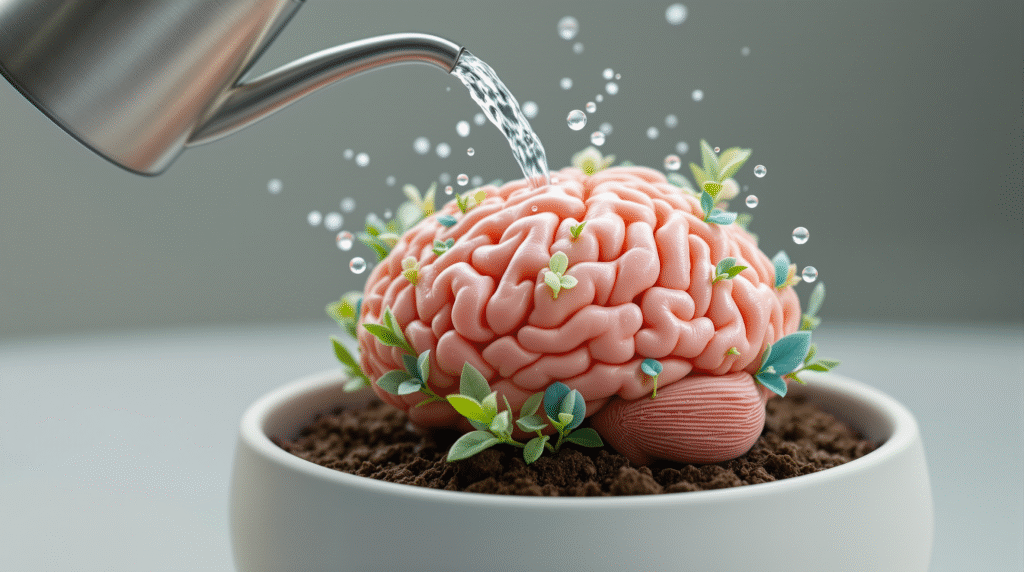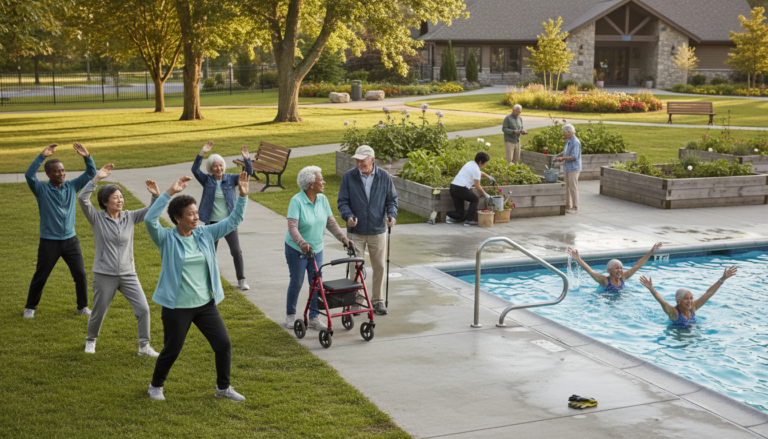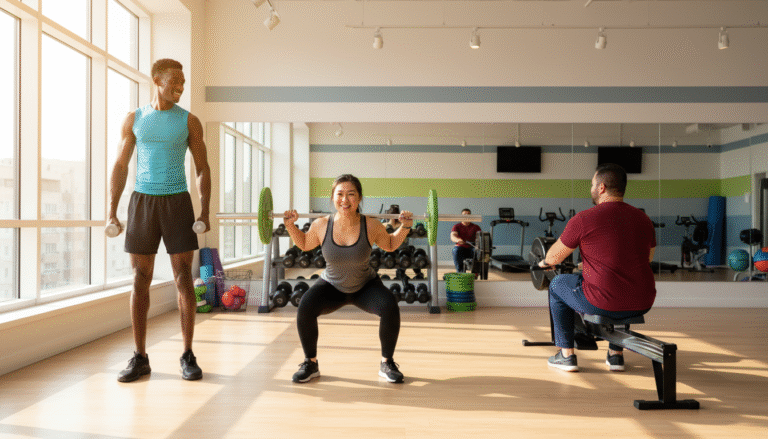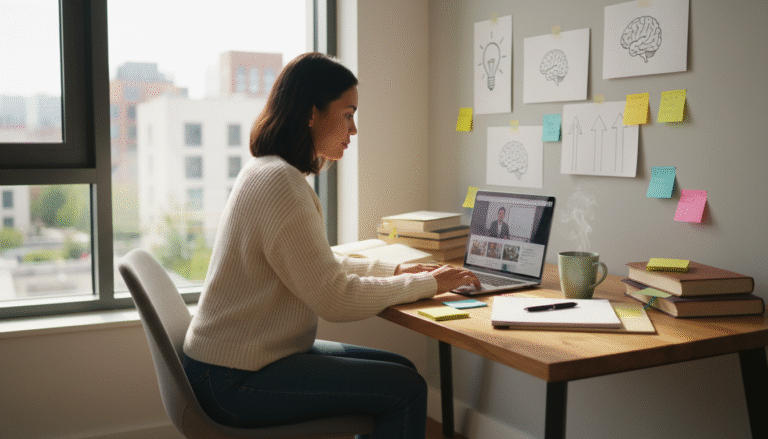Why We Need to Improve Ourselves: A Friendly Chat About Growth, Grit, and Becoming More You
A warm, practical guide to why we need to improve ourselves—covering self‑awareness, mental health, action, rest, purpose, and confidence with real research and real talk.
Ever wondered why we need to improve ourselves keeps popping up in your head—usually when you’re staring at a to-do list that looks like it wants to fight you? Same. I’ve had that exact Tuesday morning moment (fourth coffee, zero progress, big existential energy). Here’s the thing I’ve learned—self-improvement isn’t about polishing yourself into some glossy, flawless avatar. It’s about steering the evolution that’s happening anyway. Because life’s going to change you regardless; improving yourself just lets you have a say in which direction you grow.
This isn’t a pep rally for productivity or a sermon about 4 AM wake-ups. It’s a practical, human, slightly messy conversation about why we need to improve ourselves if we want better mental health, stronger relationships, more confidence, and a life that feels…truer. I’ll share the science (the real kind with citations), the lived experience (including the flops), and simple ways to start small—like, “so easy your future self will high-five you” small.
Let’s make this useful and honestly a little fun.
What You’ll Get Here (quick guide, not a spoiler)
- Why we need to improve ourselves matters for mental health, relationships, and purpose
- How self-awareness becomes your unfair advantage
- The role of action (and why motivation is wildly overrated)
- Rest as a growth tool (not a guilty pleasure)
- How to fail better and build confident momentum
- A simple 7-day starter plan to actually begin
The Real Reason Why We Need Self Improvement
We’re not action figures sealed in plastic. We’re more like software—always updating, occasionally glitching, sometimes refusing to load Instagram without a crisis. Why we need to improve ourselves makes sense when you see growth as maintenance, not makeover. Without the occasional update—new skills, better habits, a little self-awareness—the system lags. You can still function, sure, but everything takes more effort and crashes at the worst times (ask me about the time I tried to “wing it” in a big presentation and ended up inventing a brand-new word: presperation).
Here’s the unpopular truth: there’s no finish line. No beach where you can go after an early retirement as your perfect self. The point isn’t perfection; it’s participation. Improving yourself means choosing to be an active participant in who you become—rather than letting life drag you along like a shopping cart with a wonky wheel.
And the benefits don’t sit quietly inside you, either. When you grow, your relationships get kinder, your work gets sharper, your mental health steadier. That’s why we need to improve ourselves—not to be “better than,” but to be more fully ourselves.
Self-Awareness: The Foundation You Can’t Skip (I Tried)
If I could hand you one tool for growth, it would be self-awareness. Not the LinkedIn version of you, not the dinner-with-relatives version—real you. What sparks your energy? What triggers your anxiety at 2 AM? Where are the blind spots? Without this, personal development feels like assembling IKEA in the dark without instructions and, for drama, after three glasses of wine.
My personal journey started with a pattern I couldn’t ignore: the moment someone said “Let’s do drinks,” my stomach did a tiny backflip and tried to crawl away. For years I shrugged it off—“I’m just introverted,” end of story. But when I actually paid attention, I realized it wasn’t people that drained me. It was the low-key terror of saying something awkward and getting silently judged for it. Once I shifted from “I’m broken” to “I’m just triggered by judgment,” everything softened. I stopped white‑knuckling social stuff and tried simple moves: bring one good question, connect with one person at a time, and leave when my energy dips. Less drama, better data.
Why it works: when you understand yourself, your emotions stop running the show. You’re less likely to spiral at 3 AM or sink into a days-long funk. A 2018 Journal of Clinical Psychology study (Vol. 74, Issue 9) found people with clearer self-knowledge handle stress better and feel less distressed. Not Insta-wisdom—real, usable mental health science.
Try this tonight: jot down three moments this week when you felt something big, then ask, “What was I really reacting to—protecting a value or poking a fear?” Curiosity only.
Not into journaling? Do a quick “name it to tame it” when tension hits: “I’m anxious because I want respect,” or “I’m angry because I feel ignored.” Saying it out loud calms your system and gives your brain something real to work with instead of spinning.
Mental Health and Growth: Better Together (Like Coffee and Mornings)

Life is…a lot. Work, bills, family logistics, the mysterious question of whether you fed the cat or just thought about feeding the cat. Why we need to improve ourselves becomes obvious when you see growth not as hustle, but as harm-reduction. It’s how we manage stress, recover faster, and find balance when everything is on fire and you’re juggling the flames.
I started morning “brain dumps” a few years ago—ten minutes of uncensored, un-pretty thoughts on paper. It wasn’t Instagram-worthy. It did help. I could see patterns earlier and interrupt spirals before they went full tornado. The anxiety didn’t vanish; it got a volume knob.
If you prefer research to anecdotes: mindfulness-based interventions have demonstrated moderate improvements in anxiety and depression. One oft-cited meta-analysis in JAMA Internal Medicine (Goyal et al., 2014) found mindfulness programs can reduce psychological stress with effects comparable to mainstream treatments in some cases. Translation: practices like meditation, labeling emotions, and compassion training aren’t woo—they’re tools.
If you want one non-negotiable habit that pays dividends, start with sleep regularity and morning light. It’s not sexy, but circadian rhythm stability reduces anxiety, sharpens focus, and makes all the other growth work easier. Your brain’s basically saying, “Give me light and consistent sleep and I’ll give you a personality,” and honestly, fair.
Continuous Self Improvement: How Growth Quietly Heals Relationships
Here’s a plot twist I didn’t expect: the more I worked on me, the easier everyone else became. Not because I got saintly, but because I stopped reacting from old wounds. I started making progress. A friend of mine, Sarah, spent a year in therapy—not crisis mode, just routine maintenance—and her relationships softened. She wasn’t apologizing for having needs or panicking when someone offered feedback. She could disagree without combusting. It was like watching a concert where the instruments finally tuned to the same key.
The research matches the experience. Great relationships are one of the biggest predictors of a happy, longer life. The catch? Good relationships need grounded people—folks who can regulate their emotions, say what they need without a scavenger hunt, and handle conflict without going nuclear. In other words, part of why we need to improve ourselves is simple: we don’t live alone on an island. Other humans exist, and our growth makes loving them (and being loved) a lot easier. Our growth makes us easier to love and better at loving.
One practical skill: reflective listening. Try “What I’m hearing is X—did I get that right?” It sounds simple (maybe corny), but it lowers defensiveness and clarifies intent. Another tiny move: when you feel heat in a conversation, take a 15-second pause before responding. That microscopic breath often saves a big mess.
Learning New Skills: Your Brain Loves Novelty
When life feels like a looped GIF, learning something new is the upgrade button. Last year I picked up basic woodworking for no noble reason besides “it looked fun.” My first “bookshelf” belonged in a modern art museum curated by toddlers. But tinkering woke up my brain. I problem-solved differently at work. I felt…alive. Not because I needed a side hustle, but because novelty feeds neuroplasticity—your brain’s ability to form new connections and stay adaptable.
That’s not theory. Your brain rewires in response to challenge. New skills stimulate dopamine (hello, motivation), build confidence, and often lead to surprising opportunities—friends, community, sometimes career pivots you didn’t plan but secretly hoped would appear. Why we need to improve ourselves includes this simple truth: novelty prevents stagnation.
Try a tiny experiment: pick one skill you’re genuinely curious about—no resume benefits required. Learn for 30 minutes a week for one month. If you hate it, cool—now you know. If you love it, also cool—you just found a new corner of yourself.
Failure: The Teacher With Bad PR
Failure is uncomfortable, messy, and very not-fun. I once pitched myself into a project that required skills I only had 30% of. I got the job. I also botched the timeline, panicked at 2 AM, and delivered “fine, I guess” work. Embarrassing? Yes. Education? Also yes. That one spectacular flop taught me more about scope, communication, and honesty than a dozen wins.
Carol Dweck’s research on growth mindset reframed the whole failure thing: when you treat setbacks as data instead of verdicts on your worth, you get more resilient and do better over time. Caveat: mindset isn’t a magic spell; it’s a lens. It doesn’t make failure feel great. It makes it useful.
A reframe template I lean on: instead of “I blew it,” try “What was learnable? What would my 80% version look like next time?” That 80% question stops perfection paralysis and pushes you into motion.
Also, here’s the awkward truth: if you haven’t failed recently, you’re probably under-challenged. Comfort zones are cozy—and where progress goes to nap forever.
Taking Action Beats Motivation (Every Time)
You can read every book, hoard quotes, and listen to podcasts on 1.5x speed (guilty). None of it matters if you don’t take action. We think motivation creates action, but it’s often the other way around. Tiny actions create momentum, which generates motivation, which fuels more action. It’s physics with sneakers.
When I stopped waiting to “feel ready” (spoiler: readiness is a unicorn) and just did the smallest possible version of the thing—write for 10 minutes, walk for seven, send the awkward email—my brain stopped resisting so hard. Momentum did the heavy lifting.
One practical tool: If-Then Plans.
- If it’s 7:30 PM, then I put on shoes and walk for 7 minutes.
- If I finish lunch, then I write 100 words.
- If I open my laptop in the morning, then I set a 10-minute timer and clear one inbox category.
Why this works: specificity kills friction. Your brain loves clarity more than it loves big, vague goals.
Rest Is Part of the Process (Not a Reward You “Earn”)

I learned this the hard way: I pushed through months of high-output everything—work, workouts, side projects, the whole “optimize your life” buffet—and then I crashed. Not “oops, I’m tired.” The real crash where you forget words and cry at printer jams. Burnout isn’t a vibe. It’s your nervous system pulling the emergency brake because you ignored every warning light.
Here’s why we need to improve ourselves includes rest: your brain consolidates learning and rewires during downtime. Sleep, boredom, white space—this is when the invisible progress happens. Think strength training: the muscle builds in recovery, not mid-rep.
Try scheduling rest like it’s a meeting with someone you respect. Make two 15-minute white-space blocks in your day. No inputs, no “catching up,” just stare at a tree or a wall like it’s your job. And give yourself 90 minutes before bed with no heavy cognitive lifting (save the tax code for sunrise). The point isn’t moral purity. It’s nervous system maintenance.
Purpose: Your Internal Compass When the Map’s Blurry
Why do we keep working on ourselves at all? Because purpose turns effort into meaning. It doesn’t make life easy, but it makes it coherent. When I finally owned my “why” (write so people feel less alone in their messy moments), the hard days changed flavor. Rejections still stung, but they weren’t pointless.
There’s compelling science here: a study in Psychological Science found that a strong sense of purpose predicted lower mortality and better health outcomes, independent of other factors (Hill & Turiano, 2014). Purpose isn’t woo; it’s a health variable.
If you’re not sure what yours is, try this: complete the sentence “I feel most alive when I’m…” ten times. Don’t overthink it. Then try, “People come to me for help with…” five times. Circle the themes. That’s a compass, not a cage.
Confidence: The Compound Interest of Tiny Bravery
I used to think confident people were born with it, like curly hair or an allergy to shellfish. Then I realized they’ve just practiced being uncomfortable. Confidence grows when you keep promises to yourself, take small risks, and survive them. It’s deposits in an account: every “I did the thing even though I was shaky” adds up.
This isn’t the loud kind of confidence. It’s quiet and earned. It says, “I can handle things,” because you’ve handled things. Why we need to improve ourselves is, in part, to build that inner trust—slowly, steadily, without performative noise.
The Shadow Side: When Growth Becomes Self-Punishment
We have to talk about this. Sometimes, self-improvement becomes a sneaky way to confirm the belief that you’re not enough. If your inner monologue sounds like “fix yourself faster,” growth has turned punitive. I’ve been there. It’s exhausting and counterproductive. You cannot bully yourself into a version of yourself you love.

The balance that finally clicked for me: self-acceptance and self-improvement aren’t enemies. You can accept who you are today and still move toward who you’re becoming. The difference is motive. Are you improving out of curiosity and care—or fear and shame?
Quick self-check questions:
- Would I still do this if no one knew I did?
- Does this behavior feel like care—or like punishment?
- Am I allowed to rest without guilt?
Also, an important acknowledgment: not everyone has equal access to “growth.” Time, money, caregiving, health—all of it matters. If you’re in survival mode, making it through the day is the win. Please don’t let Instagram convince you your worth hinges on a morning routine with six elixirs and a cold plunge.
A Simple 7-Day Starter Plan To Make This Real
Let’s close the gap between “I get it” and “I did it.” Here’s a small, practical plan you can start today. No spreadsheets. No punishing alarms. Just seven days of tiny steps.
- Day 1: Five-minute emotion snapshots. Write down three strong emotions from the week + what you were really reacting to. Curiosity only.
- Day 2: If-Then plan. Choose one micro-habit (7-minute walk, 100 words, one glass of water). If X time, then Y action. Set a reminder.
- Day 3: Relationship rep. In one conversation, practice reflective listening: “What I’m hearing is… Did I get that right?”
- Day 4: Novelty block. Spend 30 minutes on a skill that sparks curiosity. No career pressure. Play allowed.
- Day 5: Failure reframe. Write down one recent stumble. List two learnings + what your 80% next attempt looks like.
- Day 6: Rest on purpose. Schedule two 15-minute white-space blocks. No inputs. Breathe. Stare at a tree. Let your brain file things.
- Day 7: Purpose prompts. Complete “I feel most alive when I’m…” ten times and “People come to me for…” five times. Circle themes.
Repeat next week, nudging difficulty up by 5–10% only when habits feel automatic. You’re building systems, not chasing gold stars.
The Research, Woven In (Because Facts Are Friends)
- Mindfulness and stress: Goyal, M. et al. “Meditation Programs for Psychological Stress and Well-being,” JAMA Internal Medicine, 2014. Results: moderate improvements in anxiety and depression. Find it here: JAMA Internal Medicine.
- Purpose and longevity: Hill, P. L., & Turiano, N. A. “Purpose in Life as a Predictor of Mortality,” Psychological Science, 2014. People with higher purpose lived longer and had better health outcomes. Read it at Psychological Science.
- Emotional regulation and self-awareness: Clinical psychology research supports links between greater self-knowledge and improved emotion regulation (Journal of Clinical Psychology, 2018, Vol. 74, Issue 9).
- Growth mindset: Carol Dweck’s work demonstrates that interpreting challenges as opportunities improves resilience and achievement over time (with context and nuance).
None of these studies are magic spells. They’re helpful guideposts—evidence that the boring, unsexy habits actually work.
Bringing It Home: Why We Need Personal Development—For Real
So, why we need to improve ourselves? Not to win some imaginary scoreboard. Not to out-hustle everyone you follow online. We do it to become more capable, more compassionate, more steady—and more ourselves. We do it because mental health matters, because relationships matter, because purpose matters. We do it because life’s going to change us anyway, and it’s a gift to choose how.
If you take one thing from this, let it be this: start small. Start messy. Start before you feel ready. Pick one micro-action from this article and try it this week—just one. Not perfectly. Not with a color-coded plan. Just try. As James Clear puts it in Atomic Habits, “You do not rise to the level of your goals. You fall to the level of your systems.” And I’d add: you rise again when you make the next small move, even if your hands are a little shaky.
You’re not broken. You never were. You’re human, which means you’re a work-in-progress by design. That’s not a flaw; it’s the best part. That’s why we need to improve ourselves—not to become someone else, but to become more honestly, courageously, us.
Frequently Asked Questions (FAQs)
1. Why do we need to improve ourselves?
Personal growth helps us develop new skills, take care of our mental health, and build better relationships. It’s about becoming more capable and confident in navigating life’s challenges—not about fixing what’s “wrong” with us or becoming perfect. Think of it as choosing to participate actively in your own life.
2. How does self-awareness contribute to self-improvement?
Self-awareness is the foundation of meaningful change. By understanding our patterns, triggers, strengths, and blind spots, we can make intentional choices rather than just reacting to life on autopilot. Research shows it’s directly linked to better emotional regulation and improved mental health.
3. Can self-improvement help with mental health?
Absolutely. Practices like mindfulness, journaling, therapy, and meditation have been shown to reduce anxiety and depression symptoms. Continuous self-improvement builds psychological resilience and gives you actual tools to manage stress more effectively when life gets hard.
4. What role does failure play in self-improvement?
Failure is where real learning happens, even though it’s uncomfortable. Research on growth mindset shows that viewing failure as feedback rather than a reflection of your worth leads to greater resilience and achievement over time. It still sucks, but it’s essential for growth.
5. How important is taking action in the self-improvement process?
Action is everything. Knowledge without application doesn’t create change—it just makes you really good at talking about change. Start with small, manageable steps and build momentum. Action creates motivation, not the other way around.
6. Why is rest important during self-improvement?
Your brain needs downtime to process changes and consolidate learning. Without adequate rest, you risk burnout, which completely stalls progress. Rest isn’t laziness or wasted time—it’s literally part of how growth happens, like recovery after a workout.
7. How does improving ourselves affect our relationships?
When you develop qualities like patience, empathy, and emotional regulation, your relationships naturally improve. The work you do on yourself creates space for healthier, more authentic connections. We don’t exist in isolation—personal growth ripples outward to everyone around us.
8. What are some simple ways to start improving myself?
Start with self-awareness practices like journaling for 10 minutes daily. Pick one small skill to learn just for fun. Set tiny, achievable goals—like drinking one extra glass of water. The key is consistency over intensity. Small actions repeated daily create lasting change.
9. How long does self-improvement take?
It’s a lifelong journey, not a destination with a finish line. You’re never “done” improving because life keeps changing and presenting new challenges. Focus on progress over perfection, and celebrate small wins along the way. Be patient with yourself.
10. Can self-acceptance coexist with self-improvement?
Absolutely, and it should. Self-acceptance is the foundation for healthy growth. You can fully accept yourself as you are right now while still wanting to evolve. The key is improving from a place of self-love and curiosity rather than fear and self-rejection.








One Comment
Comments are closed.